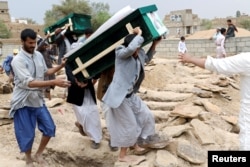The Senate on Wednesday voted overwhelmingly to move forward on a resolution ending U.S. military support to the Saudi-led coalition fighting in Yemen.
The 63-37 vote meant the Senate could start debating the resolution as early as next week.
Many of the lawmakers, from both parties, were concerned not only about the humanitarian calamity caused by the fighting in Yemen but also about President Donald Trump's reluctance to punish the Saudis for the killing of Washington Post journalist Jamal Khashoggi.
Saudi-led airstrikes against Houthi rebels include weapons bought from the United States. They have killed thousands of Yemeni civilians, destroyed hospitals and wiped out entire neighborhoods. The U.S. has also provided intelligence to the coalition.
Before Wednesday's vote, Secretary of State Mike Pompeo and Defense Secretary Jim Mattis appeared before the Senate to defend U.S. involvement in Yemen.
"The suffering in Yemen grieves me, but if the United States was not involved in Yemen, it would be a hell of a lot worse," Pompeo said.
Mattis told the senators that "the U.S. is not operationally involved in hostilities in Yemen's civil war or in situations where the threat of hostilities is imminent, other than in counterterrorism operations against AQAP and ISIS" — references to the al-Qaida in the Arabian Peninsula and Islamic State terror groups.
Civilian casualties
Lawmakers have expressed skepticism about the Trump administration's assertion that the coalition has been doing all it can to avoid civilian casualties.
"President Trump added measures to improve the coalition's deliberate targeting procedures designed to minimize civilian casualties in this conflict to the greatest extent possible," Mattis said.
A Saudi airstrike on a schoolbus bringing children back from a picnic in August killed about 40 children. Investigators said a U.S.-made bomb was used.
The coalition called the bombing a "mistake."
Pompeo told the senators that a diplomatic mission led by U.N. Special Envoy Martin Griffiths was "gaining steam."
"If that diplomacy starts to make breakthroughs, our hopes are high that hostilities will soon stop entirely," he said.
Pompeo also said the United States had sent nearly $700 million in food and humanitarian aid to Yemen in the last 14 months.
Iranian-backed Houthi rebels seized the Yemeni capital of Sanaa in 2014, sending the government fleeing to exile in Saudi Arabia. It has since relocated to the Yemeni city of Aden.
Crucial port
Much of the fighting between the rebels and Yemeni and coalition forces is focused in the key port of Hodeida, where nearly all food and emergency aid deliveries are made.
The city is in rebel hands, and the Saudis say the Houthis use the port to receive Iranian weapons, a charge Iran denies.
The U.N. has said 80 percent of Yemen's population is in desperate need of food, medicine and clean water, and it warns of famine if there is no cease-fire soon.





